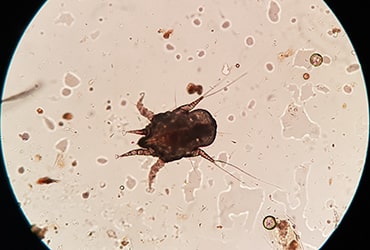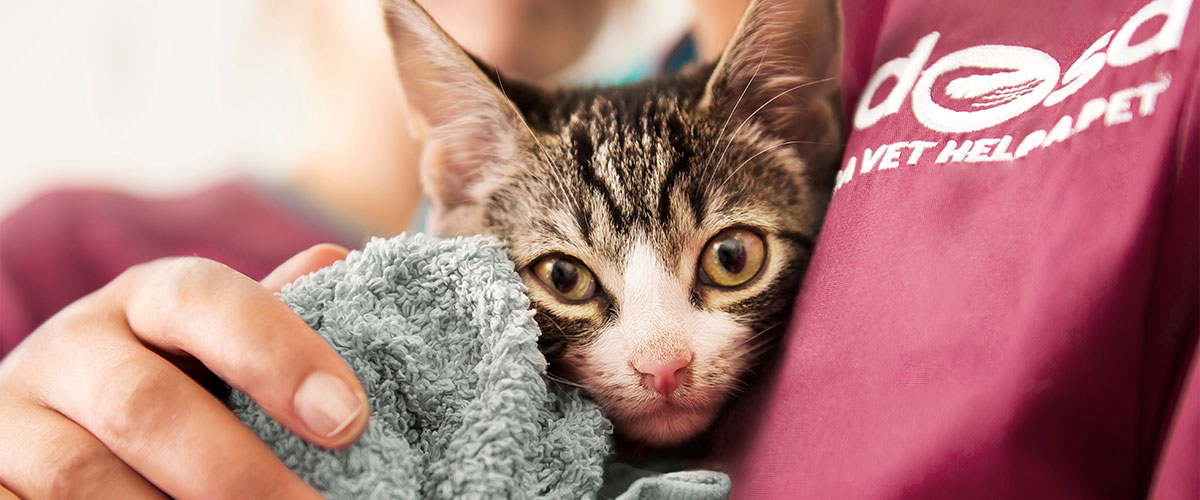Ear mites in cats and kittens
Overview
- Ear mites are tiny skin parasites that cause intensely itchy ears and often lead to ear infections.
- Any cat can catch ear mites but they are most common in kittens.
- The most common way for a cat to catch ear mites is from another cat, but they can also be picked up from the home, garden and environment.
- Fortunately, treating ear mites is relatively simple.
- Contact your vet if you think your cat may have ear mites.
What are ear mites?
Ear mites are tiny skin parasites that cause intensely itchy ears, a build-up of earwax and ear infections. Ear mites can affect cats of any age but are most common in kittens. They can also affect other animals such as dogs and ferrets.
Symptoms
Ear mites tend to affect both ears and cause symptoms such as:
- Head shaking
- Smelly ears
- Red, painful, swollen ears
- Rubbing face/head
- Ear wax (which is often dark brown)
- A swollen ear if an aural haematoma develops.

An ear mite taken from a cat.
When to contact your vet
Always get in contact with your vet if you think your cat has ear mites or an ear problem.
Treatment
Ear mite treatment
- Your vet will give your cat a treatment to kill their ear mites (likely to be a tablet or ‘spot-on’).
- Your cat may need more than one treatment to make sure all their ear mites are dead.
- Ear mites are contagious so you will also need to treat any other cats and dogs in your household.
Ear cleaner
- It’s likely that your vet will prescribe your cat an ear cleaner for use at home.
- Once a day ear cleaning will help clear out any excess wax and debris from your cat’s ears.
- Never use cotton buds to clean your cat’s ears.
Medicated eardrops
- If necessary, your vet will prescribe eardrops to help with inflammation, pain and infection.
- If your cat is given eardrops, make sure you follow the instructions and complete the course (even if your cat’s ears seem better part way through).
Treat your home
- Ear mites can survive in the environment for months so you will need to spray your home, and hot wash pet items such as bedding and grooming equipment.
- Household flea spray is effective against ear mites in the home but never use it directly on an animal. Household flea spray often contains ‘permethrin’, which is highly toxic to many species including cats, fish and birds.
Home remedies for ear mites
There are many products on the market that claim to kill ear mites, but those available without a prescription are usually less effective than a licenced product from your vet. Always talk to your vet if your cat has an ear problem. They will not only provide you with licenced, effective treatment but will also check your cat’s ears for other problems. Leaving an ear problem for too long can lead to serious problems.
Prevention
Regularly treating your cat for fleas is the best way to prevent ear mites. Many of the products we use to kill fleas or other parasites also kill ear mites.
Consider insuring your cat as soon as you get them, before any signs of illness start. This will ensure you have all the support you need to care for them.
FAQ
Can ear mites cause deafness? Ear mites don’t directly cause deafness, but left untreated they can lead to serious ear disease or infections that can cause hearing loss.
Can ear mites cause seizures? Ear mites don’t cause seizures but left untreated they can lead to serious ear disease (such as middle or inner ear infections) which can cause a head tilt or loss of balance.
Can humans catch ear mites? It’s extremely rare for humans to catch ear mites from a pet but it is possible. If you are worried or someone you know may have mites, it is best to contact your doctor, or the NHS for advice.
Published: August 2020
Did you find this page useful?
Tell us more
Please note, our vets and nurses are unable to respond to questions via this form. If you are concerned about your pet’s health, please contact your vet directly.
Thank you for your feedback
Want to hear more about PDSA and get pet care tips from our vet experts?
Sign up to our e-newsletter
Written by vets and vet nurses. This advice is for UK pets only. Illustrations by Samantha Elmhurst.

